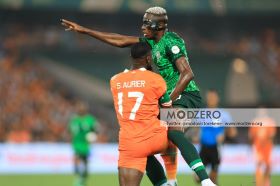Five reasons Super Eagles were outplayed by Ivory Coast in 2023 AFCON final
Published: February 13, 2024
In a thrilling showdown for continental supremacy, the Super Eagles of Nigeria faced off against the Elephants of Ivory Coast in the 2023 Africa Cup of Nations final.
However, despite their valiant efforts at this year's tournament, the Super Eagles fell short, succumbing to a 2-1 defeat to their Ivorian counterparts on the grand stage despite scoring first.
The Super Eagles showcased moments of brilliance and determination en route to the 2023 AFCON final, but were ultimately outplayed by a resilient Ivory Coast side on the grand stage.
Defensive and set-piece vulnerabilities, midfield instability, tactical deficiencies, and mental fragility all contributed to Nigeria's avoidable downfall.
As pundits and fans alike dissect the match, allnigeriasoccer.com takes a look at the critical factors that have emerged, shedding the light on why the Super Eagles were outplayed on the grand stage.
1. Defensive Vulnerabilities
One glaring issue that plagued the Super Eagles throughout the final was their defensive frailty. The Nigerian backline struggled to contain the pace and power of the Ivorian attacking line, often finding it difficult to halt crosses into their penalty area from the Ivorian wingers.
Defensive lapses allowed Ivory Coast to capitalize on scoring opportunities, putting the Super Eagles on the back foot early in the match.
2. Set-piece Vulnerability
A significant factor that contributed to Nigeria's defeat in the 2023 AFCON final was their vulnerability in defending set-pieces.
Despite their overall defensive capabilities, the Super Eagles struggled to cope with the aerial threat posed by the Ivorian team during dead-ball situations.
This weakness was exploited by Ivory Coast, who capitalized on corners to create scoring opportunities and ultimately find the back of the net.
The inability to defend set-pieces effectively proved costly for Nigeria, as it allowed their opponents to gain crucial momentum and control of the match.
3. Midfield Instability
Midfield instability emerged as a significant concern for Nigeria throughout the final. The Super Eagles struggled to establish control and dictate the tempo of the game, with their midfield often overrun by the dynamic Ivorian midfielders.
A lack of cohesion and communication in the middle of the park hindered Nigeria's ability to build sustained attacks and maintain possession, allowing Ivory Coast to dominate proceedings.
4. Tactical Deficiencies
Tactical shortcomings also played a role in Nigeria's defeat, as the team appeared unable to adapt to Ivory Coast's style of play.
Despite initial tactical setups, the Super Eagles failed to adjust their approach effectively in response to the unfolding dynamics of the match.
This failure to adapt allowed Ivory Coast to exploit weaknesses and capitalize on opportunities, ultimately tilting the balance of the game in their favor.
5. Mental Fragility
Finally, the psychological aspect of the game cannot be overlooked, as the Super Eagles appeared to lack the mental resilience needed to overcome adversity.
Conceding an early second half goal and facing an uphill battle seemed to dent Nigeria's confidence, leading to a sense of frustration and anxiety among the players.
This mental fragility hindered their ability to mount a comeback and regain control of the match, ultimately sealing their fate in the final.
Ejim Kaycee
Copyright ANS
All rights reserved. This material, and other digital content on this website, may not be reproduced, published, rewritten or redistributed in whole or in part without prior express written permission from allnigeriasoccer.com
- Tolu Arokodare: Brand new Nigeria international will reach Genk milestone against Anderlecht
- Boniface's impact: Three reasons Super Eagles striker is crucial to Bayer Leverkusen's title hopes
- Juventus defender admits Osimhen was the toughest opponent he had to mark in Serie A
- Nwaneri and Butler-Oyedeji: Two Super Eagles-eligible attackers nominated for Arsenal GOTM
- What Southampton coach about subbing Onuachu, nephew of ex-Super Eagles CB v Crystal Palace
- Ikpeba names four Super Eagles players, including Troost-Ekong, who had a good game v Zimbabwe
- Interest in Lookman: Transfer market expert reveals Napoli considering swap deal
- 2025 U17 Afcon: Promising midfielder chooses Uganda over former world champions Nigeria, England
- KAA Gent locked in talks with Super Eagles central defender over new contract
- 'He'll be out for a while' - Nottingham Forest boss confirms Ola Aina suffered a calf injury
 Football News 24/7
Football News 24/7

- Football Betting
- African Players
- Australia/ Asia
- Belgian Championship
- Bundesliga
- Danish Football
- English Premier League
- Nigeria National Teams
- Casinos not on Gamstop
- Nigeria Premier League
- Norwegian Football
- Polish Football
- Russian Championship
- Serie A
- Spanish Liga
- Swedish Championship
- Transfer
- Turkish Championship
- 1Win
- Ukrainian Football
- Uncategorized
- Women's Football
- New88
- hi88
- RR88
- hi88

